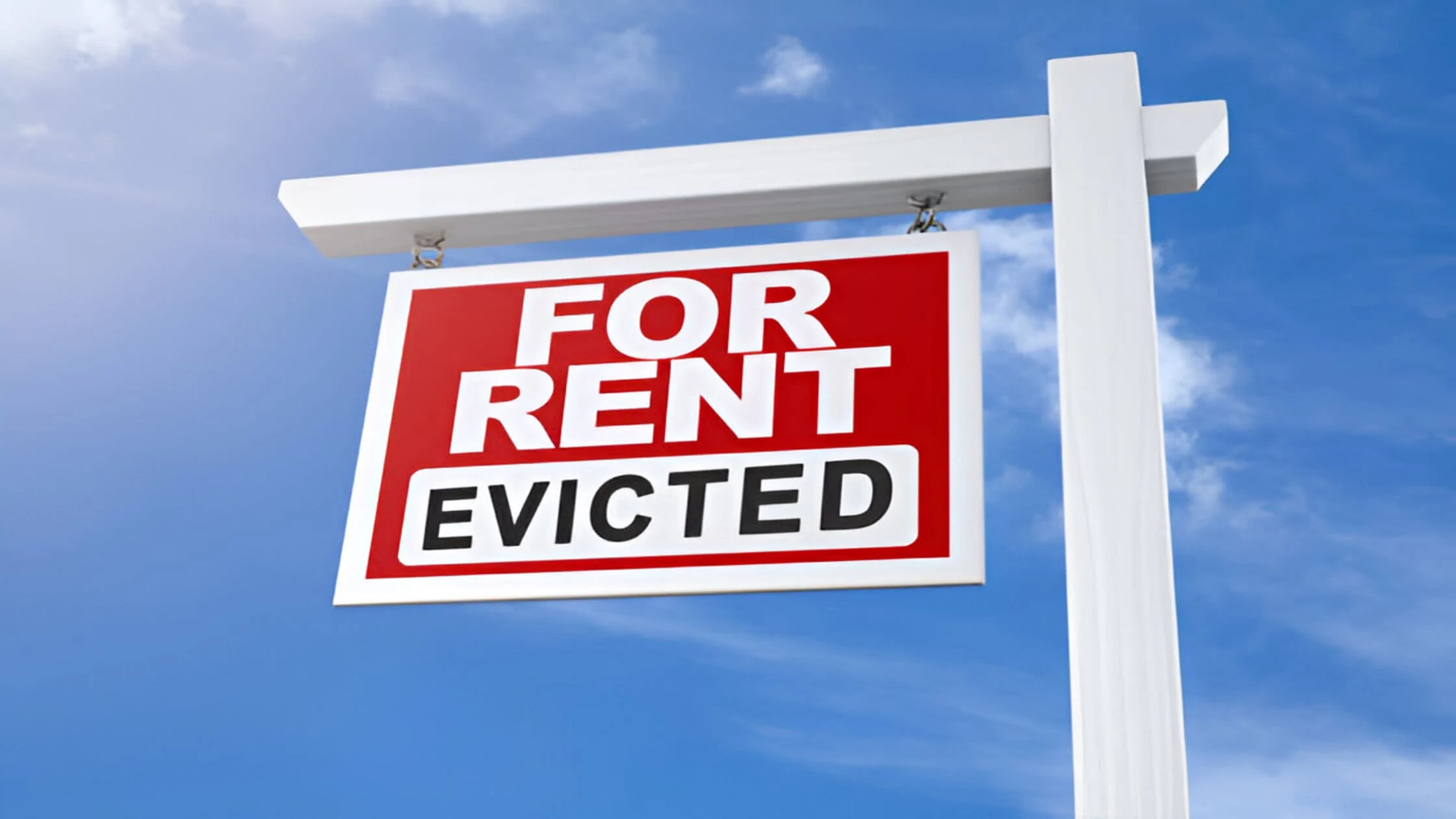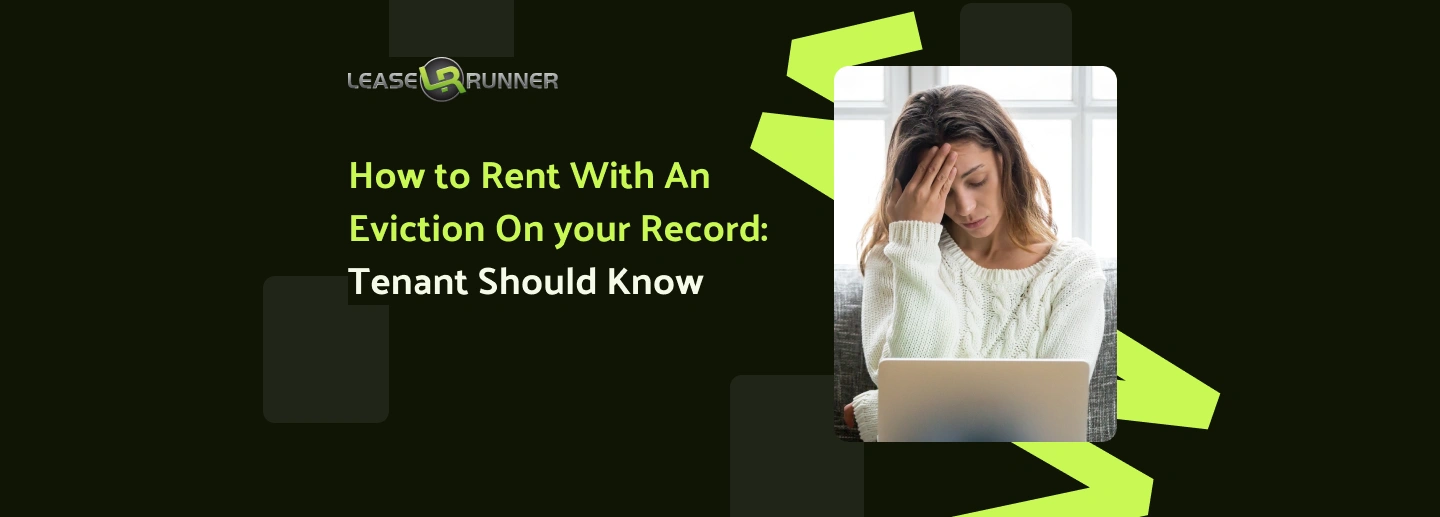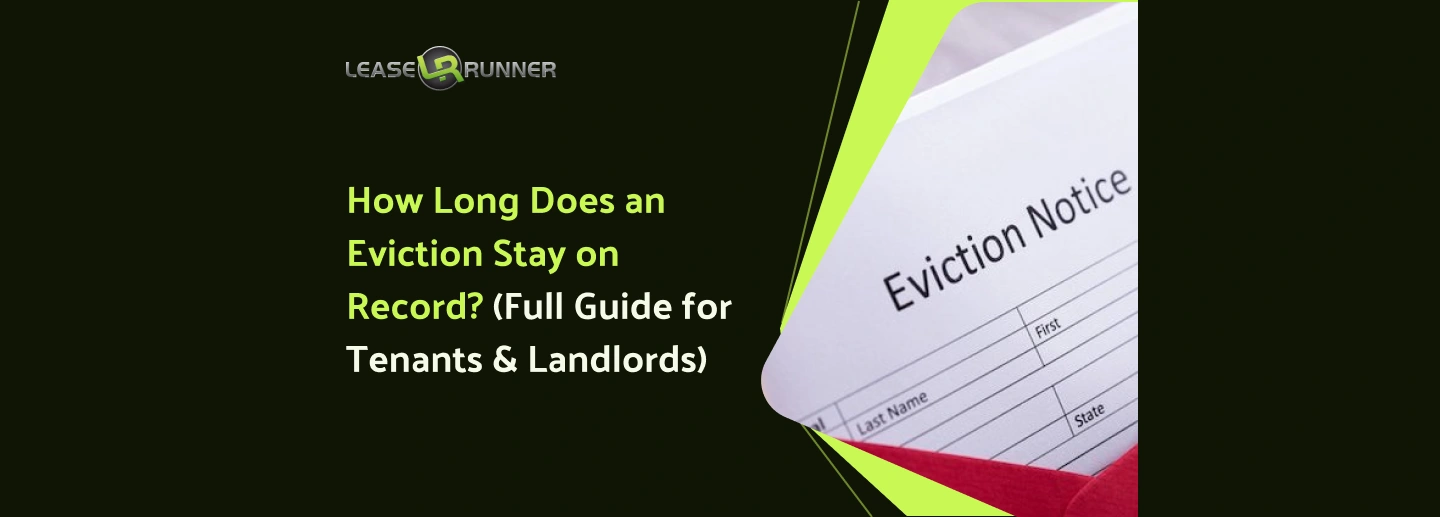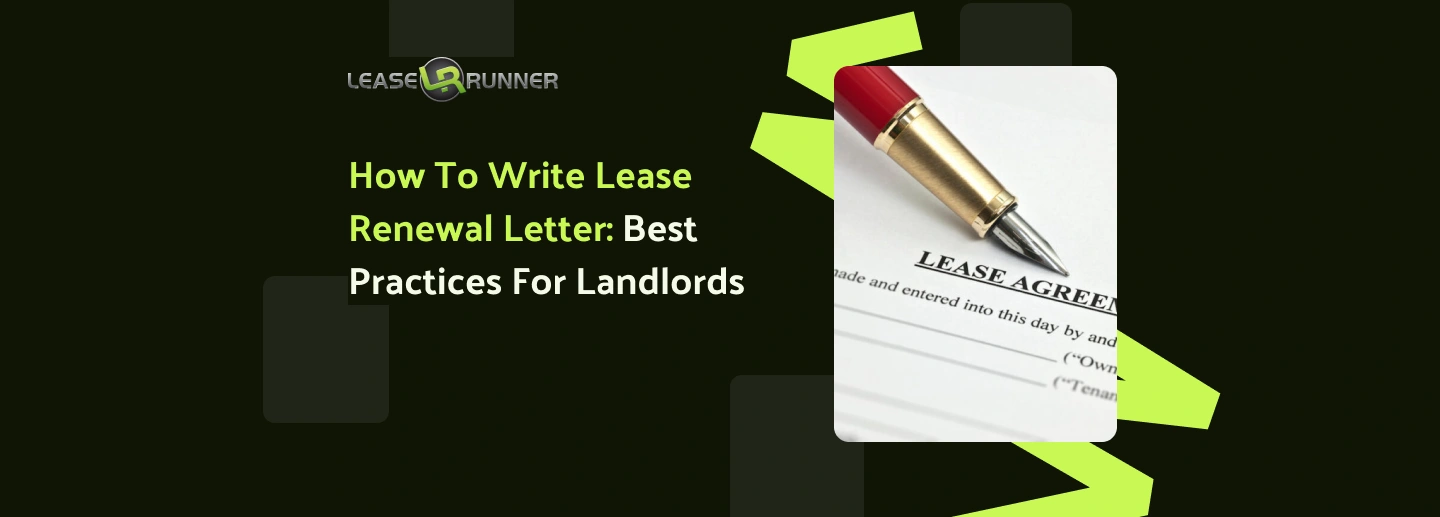Facing an eviction doesn’t mean your rental journey is over. Understanding how to rent with an eviction on your record is crucial if you want a new place to call home. Many renters wonder, “How long after an eviction can I rent again?” or “If you get evicted, can you rent again?” There is hope, even with a challenging history.
At LeaseRunner, we guide tenants every step of the way—giving you the tools and real-world strategies to find housing for people with eviction records, including advice on landlords that accept evictions and places that accept evictions.
This complete guide breaks down every part of the process, from learning how long an eviction stays on your record to building a stronger application and connecting with second-chance resources for a fresh start.

Key Takeaway Table: Quick Facts for Renting After an Eviction
What is an Eviction?

Eviction is a legal process that is done lawfully by the landlord. The landlord evicts the tenant from the rental unit, typically for non-payment of rent or for violating other sections of the lease/rental agreement.
The process usually starts with a written notice such as a "Pay or Quit" notice, or a "Notice to Cure" (typically, a notice that requires the tenant to cure or fix a violation). When the stated action is still unresolved, the landlord may file a formal complaint/pleading in court to begin the legal eviction process.
The duration of the eviction process from notice to removal can often take weeks to several months for the entire process, depending on local laws in your area and whether the courts have backlogs.
The outcome becomes a public record and can affect your ability to rent again. For more on eviction types and the notice required, review our guide on the types of eviction notices.
Evictions are stressful and can happen for many reasons, including:
- Not paying rent on time
- Repeatedly violating lease terms
- Causing major property damage
- Other lease-breaking behaviors
Not all rental disputes result in eviction. Sometimes issues are resolved, and no record is created. Knowing the difference can help you explain your story if you need to.
How Long Does an Eviction Stay on Your Record?

Many renters are concerned about how long an eviction remains on their record, an important question when planning new housing applications.
In most states, eviction records can remain on tenant screenings and public record searches for up to 7 years. However, some states and cities have shorter limits, typically less than seven years.
- California: Seals eviction records if no landlord judgment is made.
- Oregon: Expunges records after 5 years if debts are paid or if eviction was dismissed.
- Minnesota: Expunges records if tenants vacated before filing or were not properly notified.
- Washington, D.C.: Temporarily seals eviction records, with ongoing legislation for permanent protection.
These regulations exist to help protect tenants from the long-term negative impacts of eviction records. They also ensure a fairer process when landlords are screening potential tenants, preventing discrimination or undue hardship based on outdated or unjust eviction cases.
As always, it is best to check with your state’s laws because some states will allow you to seal or expunge an eviction from your record sooner than that, particularly if the court ruled in your favor or you settled with your landlord. For detailed information on eviction laws specific to your state, visit the LeaseRunner blog for a comprehensive state-by-state guide.
Let’s dig into where and why an eviction appears:
- Tenant Screening and Public Records: When a landlord initiates an eviction process—including if the case is later resolved or dismissed—a public legal record is created.
All tenant screening services acquire this public record directly from court records and provide it to landlords, property managers, and organizations that conduct evictions for up to 7 years.
Most people's eviction filings are publicly available via screening services ahead of authorization checks. Some states allow you to ask to seal the filing if it was either dismissed or decided in your favor, so it won’t come up in the next landlord background check.
- Credit Reports: While the eviction itself typically doesn't appear directly on credit reports, any unpaid rent or related costs sent to collections will show as a negative item, impacting your credit for up to 7 years. Paying off such debts is crucial for improving your rental application prospects.
- Landlord Databases: Beyond public records, property managers often maintain their own internal lists of tenants with negative rental histories.
These private databases frequently adhere to the 7-year standard for holding data, though some company policies may retain information for a longer period. If you’re applying to landlords that accept evictions, ask if they use a private list or a national service.
State Differences in Expungement and Sealing

Eviction records are generally public for 7 years, but many states have their own unique procedure that allows removal or sealing of a matter in a more timely manner.
- For example, the California rules allow tenants to seek a sealing of an eviction record if the tenant prevails, the case is dismissed, or the tenant and landlord reach a settlement. Illinois allows for expungement of the records if the matter is dismissed or if the tenant pays the judgment and meets other requirements.
- Under similar rules, in Oregon, a tenant can petition to have eviction records set aside when a case has been dismissed or certain other conditions apply after judgment.
- Texas has the most stringent rules regarding sealing eviction records, and only allows for sealing of cases with a judgment for the tenant, and expungement of satisfied judgments is rare.
- New York has changed its legal structures, making it able to seal eviction records in a small number of situations, for example, when a case is settled, dismissed, or a tenant wins. Florida, on the other hand, typically keeps all eviction records from the public for a full 7 years unless there is a rare judicial order by the judge to expunge.
These differences matter: in some states, sealing or expungement can occur in only a few months of the requirements being met, whereas some states (such as Florida) never allow for removal before the full 7 years since the eviction.
Because states change laws periodically, always consult your local housing authority or legal aid to confirm the law applicable in your specific locality—particularly in times of planning to rent when an eviction has appeared on your record or in seeking housing under a plan for people with eviction history.
How to Check If You Have an Eviction on Your Record?
If you want to know how to rent with an eviction on your record, you must first confirm if and how the eviction appears in the public record and any related files. Here’s a simple step-by-step plan:
- Run Your Own Tenant Screening Check: Use a trusted service like LeaseRunner’s Eviction Check. This tool lets you see exactly what landlords and property managers will find, including whether they are open to applicants with an eviction record. If you spot the eviction, you’ll know you must address it with new applications.
- Get Your Credit Report: Focus on collections tied to old rentals—unpaid balances or debts from a previous landlord can hurt your application.
- Search Court Records Directly: Many court websites let you search eviction filings by name. Type in your details to see if anything shows up. Look for alternate spellings or errors—sometimes incorrect info can create a duplicate record.
- Contact Past Landlords: If you’re unsure if you were ever formally evicted or if a dispute shows in screening reports, ask your old landlords. They can tell you if they reported missed rent or if they sent your info to a collection agency. Honest communication can also help you understand more about local laws and know if the property you're considering is open to applicants with an eviction history.
- Rectify Mistakes Quickly: On the off chance that you discover an error— an eviction that should have been thrown out, a duplicate, or a balance already paid— you should dispute it right away with the tenant screening company, credit bureau, or courthouse. Develop proof: payment receipts, a letter from the court, and/or a settlement agreement. Correcting errors can be the difference between getting the lease and being denied.
Example Fake Scenarios To Understand The Situations Better
- After missing rent due to a job loss, Mark was evicted in 2021. He settled his debt, but the eviction still appeared in LeaseRunner’s record in 2024. After contacting the court and learning about his state’s sealing policy, he submitted paperwork to have his record expunged.
- Tina left her apartment in 2019, but a dispute over move-out cleaning led her landlord to send a $400 charge to collections.
She checked her credit, paid off the debt, and got a letter from the agency to show new landlords. This helped her get approved at one of the local properties that considers applicants with eviction histories..
Although the two scenarios above are fake, you can still take a quick look at them and have a clearer view of what actually happens in these situations.
Pro Advice
- Always check your records before applying for a new rental. Understanding what landlords can see regarding evictions is the first step to being proactive.
- Keep receipts and legal documents. If you pay an old debt or win a court dispute, save the paperwork. Attach these to your rental applications.
- Ask about expungement if you meet the criteria. Legal aid or local housing counselors can walk you through the process.
By taking these detailed steps, you can be ready to explain your situation, address issues, and show landlords who accept evictions or housing for people with eviction that you’re a strong, responsible tenant with a plan for moving forward.
How to Rent an Apartment After an Eviction Successfully?

Getting back on track is possible. Here’s how to rent with an eviction on your record by breaking the process into practical, proven actions.
1. Address Past Issues
Start by cleaning up your history and debts. Even if your eviction is recent, taking responsibility is a big first step.
Pay Off Outstanding Debts
If you owe money to a previous landlord, pay it off or agree to a payment plan. Get written confirmation and ask for a letter showing your debt is settled. This shows new landlords you’ve taken care of the business.
Check Your Rental History
Request a copy of your screening report from LeaseRunner or similar services. Check it for mistakes and dispute any errors you find. A clean report—or a fixed record—will make a big difference for future approvals.
2. Strengthen Your Application
Landlords want proof that you’re trustworthy now. Here’s how to stand out when you apply:
Be Honest
Don’t hide your past. If you get asked, “Why were you evicted?”, explain briefly and clearly. Show what you’ve done to prevent this from happening again.
Gather References
Strong references make a huge impression. Ask for letters from employers, past landlords (especially after your eviction), property managers, or community leaders that can vouch for your reliability.
Prepare a Renter’s Resume
Give your application a boost with a simple “renter’s resume.” Include details about your job history, income, rental history, references, and why you would be a responsible tenant now.
Offer a Higher Deposit or Prepay Rent
Show commitment and financial stability by offering to pay a larger deposit or more months up front. This lowers the landlord’s risk and may convince cautious landlords who accept evictions.
3. Target the Right Landlords
Not every property management firm will say yes, but you have options.
Focus on Private Landlords
Private landlords are often friendlier toward tenants with past evictions. Search sites like Craigslist or Zillow (look for “rent by owner”) and reach out directly. Most places that accept evictions are small operations, not big management companies.
Consider Cosigners
A cosigner or guarantor with better credit can reassure landlords. This person promises to pay if you can’t.
Be Open to Alternative Housing
Second-chance rentals, extended-stay complexes, or housing agencies sometimes offer alternative housing solutions designed for individuals with past evictions.
These programs may have higher upfront costs, but are more likely to work with you. Use trusted locators, such as Second Chance Apartments or local organizations specializing in supporting applicants with an eviction background.
4. Demonstrate Financial Responsibility

Show how you’ve turned things around since your eviction.
Improve Your Credit Score
Pay debts on time and settle outstanding balances. The higher your score, the better your rental odds—even with an old eviction. Keep loans in good standing and check your credit regularly.
Show Proof of Income
Provide pay stubs, offer letters, bank statements, or tax returns. Stable income is huge for landlords deciding on applicants with eviction cases.
5. Use Specialized Resources
Go beyond basic listings and use expert support to find landlords or properties more willing to consider applicants with an eviction record.
Apartment Locators and Brokers
Certain agents and brokers specialize in helping tenants with tricky histories. Tell them your situation and ask about landlords specializing in or open to second-chance rentals. . A pro can be your advocate in tough markets.
Legal and Housing Counseling
Local housing non-profits, counseling agencies, and legal aid can guide you through disputes, expungement, and finding housing. Many tenants qualify for free or low-cost support—don’t be afraid to reach out.
6. Stay Persistent and Positive
Securing a rental with an eviction record may take time, but determination pays off.
Explain the Circumstances
If you lost your job, had unexpected expenses, or faced emergencies, be ready to share your story simply and factually. Providing evidence—like proof of new employment or reference letters—shows real change.
Build a Better Rental Track Record
Start with smaller, less strict rentals. Even a short-term or roommate arrangement gives you a chance to show you can pay rent in full and on time for months in a row. Each success helps soften the impact on your record and gives you more to show future landlords.
Additional Support Strategies for Evicted Tenants
If you’re learning how to rent with an eviction on your record, there are several support strategies available that can make finding rental opportunities for individuals with past eviction histories much easier. . Building a strong application is just the first step—creative support can open more doors.
Find a Roommate, Cosigner, or Guarantor
Teaming up with a reliable roommate often helps when facing strict screening. For example, if your roommate has a clean record and steady job, some landlords who accept evictions may let them be the primary leaseholder, lowering your risk profile. Another option is to find a cosigner or guarantor.
A family member with good credit can sign your lease and promise to cover the rent if you can’t. Many properties that work with eviction histories look at the cosigner’s credit more than your own, giving you a better chance.
Seek Legal Aid or Representation
If your record is incorrect, locate your local legal aid or tenant advocacy agency. They provide services in disputing wrongful evictions, filing applications to seal records, and defending tenants against unfair judgments. Legal expertise can help you clear errors that make finding suitable housing for individuals with past eviction records.
Be Honest and Clearly Communicate with Landlords
As the application process gets underway, bring recent pay stubs. Recent letters from previous landlords, as well as a written statement of your circumstances to the landlord. If you are honest about your history, many landlords will listen and give tenants who have eviction records a chance.
Timely communication and being your honest self build trust and improve your likelihood of finding properties that will more easily consider applicants with an eviction history.
How to Avoid Future Evictions?

It is important to know how to rent with an eviction on your record, but it is even more important to remain in stable housing and develop a relationship with potential landlords or properties that are open to applicants with an eviction history.
By budgeting smart and communicating frequently, you increase your chances of renting again in the future.
Budgeting Effectively for Rent
- Be sure to keep track of every aspect of your income: income from work, cash from public benefits, cash from family, EBT (electronic benefit transfer), or any other income stream.
- List out all of the monthly expenses, monthly bills, including rent, electricity, groceries, phone, insurance, transportation, etc. Compare your monthly expenses to your monthly income; if your expenses are coming close to, or in the negatives, you should act and stop renting immediately!
- Assuming your expenses are high enough to take rent from the top of your budget, and some rent is considered part of the expenses, if you can see that you may be short on rent for that month's payment, communicate with your landlord for the month of concern, before missing your rent payment.
In many housing programs for people with eviction, doing things the right way (for example, honesty) is encouraged. Some landlords will be agreeable to payment plans or accept some rent payment with enough warning ahead of time, instead of simply reacting after the due date has passed.
For example, if you are aware your rent is going to be late on the payday after the first due date of rent, make it a practice to let your landlord know in writing or by email that your rent payment will be delayed and you would like a few extra days beyond the due date.
These conversations won't dissolve situations, but they will help to avoid any arguments and incidents that will affect your rental record.
Maintaining Good Communication with Landlords
Communication is vital when renting after an eviction. If a problem pops up—such as a broken heater, water leak, or noise complaint—let your landlord know the same day. If you lose your job or have a big change in your finances, tell your landlord and discuss your options as soon as possible. This shows respect and accountability.
Good landlords and landlords who accept evictions are more willing to work with tenants who are upfront about problems rather than those who surprise them with bad news later. Keep records of all messages and agreements.
If you resolve an issue—like quickly fixing a noise complaint or arranging a payment plan—mention these successes in your next rental application to prove you are a responsible renter now. Taking these steps makes it easier to secure rental housing with a past eviction on record in the future, and lowers the chance of another eviction.
Conclusion
How to rent with an eviction on your record comes down to knowing your history, being proactive, and approaching landlords who look beyond the past.
Whether you’re searching for rental opportunities when you have an eviction history, wondering how long after an eviction you can rent again, or seeking advice on landlords open to such applications, you can succeed with the right planning.
Always focus on resolving debts, building honest relationships, and using all available resources—like second-chance programs, cosigners, and counseling—to find landlords willing to consider applicants with an eviction background and turn the page on your rental story.
To help you get started, check your rental history with LeaseRunner's comprehensive screening tools today.
FAQs
Q1. Does an eviction hurt your credit?
Evictions don’t appear directly on your credit report, but debts sent to collections will, lowering your score for up to 7 years. Timely payments and resolving debts help rebuild it quickly.
Q2. How long after an eviction can I rent again?
Many renters secure homes within months by paying off debts, finding properties that consider applicants with an eviction history, or applying with a cosigner. Landlords may require extra deposits and proof of stability, but new leases are possible even while the record is active.
Q3. How do I negotiate with hesitant landlords due to my eviction record?
Be upfront about your history. Offer a higher deposit, letters of recommendation, or proof of new income. Focus on small/private landlords or agencies that advertise as landlords that accept evictions.
Q4. What should I do if my eviction record includes inaccurate information?
Review your screening and credit reports carefully. Dispute inaccurate or duplicate entries with the agencies involved and seek legal aid if needed. Some states allow you to seal or expunge records sooner if errors exist.



![Can a Landlord Stop an Eviction? Comprehensive Guide [Update]](https://www.leaserunner.com/storage/442/01KEF27R27YC4D4GV44TKW9S8C.webp)



